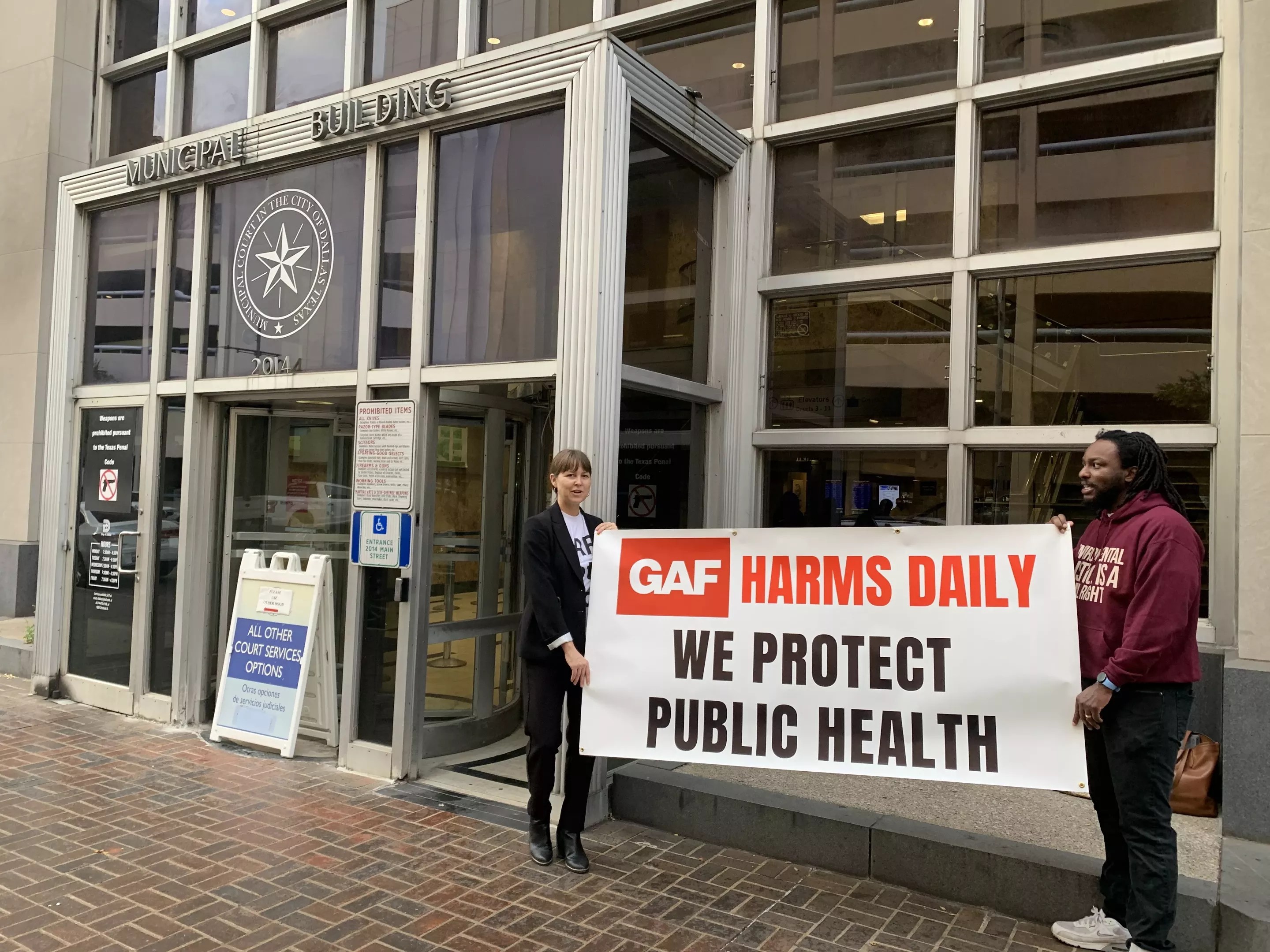
Emma Ruby

Audio By Carbonatix
When Janie Cisneros walked onto Singleton Boulevard on April 22, 2024, she knew she was breaking the law. So, too, did the four individuals flanking her who stepped onto the road and sat down along its edge. Within a few seconds, a supervising Dallas police officer pulled his vehicle into the lane, blocking the group from oncoming traffic. Within a few minutes, their drivers licenses were collected and they were issued citations for obstructing the roadway.
Cisneros is the leader of Singleton United, a West Dallas community group dedicated to shutting down the GAF shingle factory on Singleton Boulevard because they believe the plant is creating pollution that impacts their health. The activists succeeded in shutting down the factory on Earth Day this year in a planned demonstration of civil disobedience.
But on Tuesday afternoon, a Dallas County judge kept the environmentalists’ dream of putting the plant on trial from being realized, siding with state prosecutors who argued the case was a “straightforward” one pertaining to liability, not motive or cause.
Cisneros and her fellow defendants – nonprofit director Jim Schermbeck, Justice for Joppa Co-Chair Emmanuel Davis, environmental justice advocate Allen McGill and retired attorney Ruth Alhilali – were found guilty and fined $97 for the street-blocking stunt.
“We wanted to present our defense and talk about why we took this action, which was necessary, on April 22. It’s a shame that we didn’t get to present that,” Cisneros told the Observer after the trial. “[Civil disobedience] was an avenue of last resort, considering all the other avenues that we have sought and have been stalled and obstructed by the city, the state, GAF itself.”
The Trial the Defendants Had Wanted
Cisneros, Schermbeck, Davis, McGill and Alhilali had intended to tell the court that because of the conditions caused by the GAF shingle factory that West Dallas residents have endured, they had no choice but to break the law and raise awareness for environmental injustices.
“We were doing what anyone would do to protect their children,” Cisneros said on the stand, adding that the “stench” emitted from the factory regularly gives her headaches and prevents her from enjoying her yard.
Her testimony was one of few moments where direct references to GAF were allowed.
At the trial’s start, Dallas County Judge Marcia Tillman sustained a motion by the prosecution to keep the mens rea – or the mental state of each defendant at the time they committed the crime – out of the case. This resulted in questioning that pertained almost exclusively to the semantics of roadway engagement: whose foot stepped into the road at what time? How many inches into the road was the step? How many cars were passing by at that moment? Did the Dallas Police Department block the road “milliseconds or many seconds” later?
The organizers each maintained that the Earth Day protest had been planned “for months” alongside the Dallas Police Department, and each individual who took the stand claimed the step into the road had been approved by a liaison for the department.
But two officers who were on the scene the day of the protest claimed they had not been informed of the protesters’ plans to venture into the roadway. Body camera footage viewed in the courtroom showed officers approaching each of the defendants as they sat in the entryway of the GAF factory and asking them to move out of the roadway. One protester can be heard responding they would not comply, and another stated they’d hoped to be arrested.
“If we didn’t take action they were going to get hit by a vehicle,” said Officer Dylan Nelson, who helped issue the citations given to the protesters.
Additionally, testimony referencing a Texas A&M University study released earlier this year that found evidence of “toxic air” conditions in the neighborhood surrounding the factory was repeatedly objected to, with the state maintaining that an expert witness would be required to speak to the studies findings.
Cisneros said she was “frustrated” by questioning she faced on the stand, which she felt precluded her from fully sharing her firsthand experiences as a homeowner living several hundred feet from the GAF factory. Defense Attorney Bruce Anton also seemed frustrated as the trial concluded, stating he was unable to present the necessity defense that had been planned due to the court’s refusal to accept each activist’s firsthand knowledge and testimony without an expert witness present.
“The city attorney’s office wants the public to know there is no room for peaceful protest in Dallas,” Anton said in his closing argument.
Anton and Cisneros both said they intend to appeal the ruling.
“While I may not be a doctor, we see the emissions, we experience what we experience when we inhale the pollution,” Cisneros said after the trial’s conclusion. “This is a community that’s hurting, that’s sick and it’s going to continue to keep being sick as long as the facility stays open. It is continuous harm on a daily basis. So us sitting down for those few minutes on April 22 is nothing compared to that harm.”